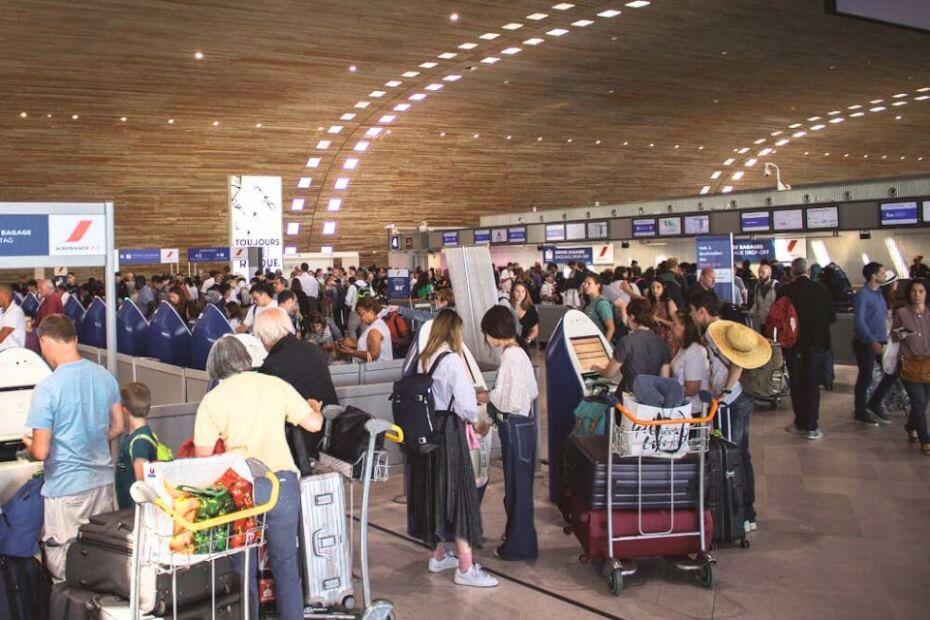
The upcoming launch of the European Union’s (EU’s) Entry/Exit System (EES) is causing more warnings for airline passengers.
Anton Radchenko, CEO of flight compensation firm AirAdvisor, has warned that the new border check system could cause chaos.
His concern stems from the technology being “notoriously prone to outages,” as per a report by Birmingham Live.
Radchenko cited the recent nationwide electronic gate (eGate) failure in the UK, which caused long queues and massive delays.
He added that airline passengers who miss their flight due to EES mishaps cannot claim compensation or request a fare adjustment.
“Passengers who miss a flight due to security or immigration processing reasons unfortunately do not have the right to request the airline to book a new flight free of charge,” Radchenko said.
He advised that those with a non-refundable ticket can ask the airline for a refund.
He suggested passengers can still “claim back airport taxes and fees” if the airline doesn’t refund the ticket cost.
The AirAdvisor CEO added that passengers still need to spend extra and use the refund to buy a new ticket.
Travel and Tour World reports that this could lead to frustration and dissatisfaction among passengers already burdened by longer wait times.
EES potential delays for airline passengers
The EES is an automated IT border system designed to record the entry and exit of non-EU nationals traveling to and from the Schengen Area.
It will apply to EU-bound travels outside its external border, such as from the UK to Germany, and vice versa.
However, the EES is not applicable when traveling within the EU, such as from Germany to Sweden.
The system will replace manual passport stamping with a more efficient, secure method of recording traveler’s biometric data.
It will affect all non-EU travelers, both short-stay visa holders and non-visa nationals, who are British citizens.
Travel and transport officials warned that the EES would cause long queues and hour-long delays.
Non-EU travelers must register their passports and facial and fingerprint scans before an EU border officer.
The EES system will only keep travelers’ data for three years and will refresh every time they visit the Schengen Area.
If non-EU travelers visit again after their data has expired in the EES system, they must register their data again.
If a traveler receives a new passport, they must also register in the EES again.
Registering passport and biometric data in the EES is expected to increase processing times, particularly during peak travel periods.
The airline industry predicted that border control would take a minimum of 30 to 50 percent longer once the EES becomes live.
Still, the EU expects no significant delays and estimates that EES registration will take only 90 seconds to two minutes per person.
Entry/Exit System’s reliability issues
Radchenko said the new border check system is designed to “offer ‘frictionless’ travel.”
He fears that “if the rollout of the technology isn’t flawless, airline passengers could face chaos at UK borders when systems go down.”
Should the technology fail, human border staff officers will need to perform immigration checks manually.
“Airports will need to be conscious of this – and won’t solely be able to rely on the new technology,” Radchenko stressed.
There are currently around 270 eGates at UK borders, which must all be upgraded to accommodate the EES.
The International Air Transport Association (IATA) has raised the alarm about the system’s reliability due to inconsistent and delayed national testing.
It added that there has been a lack of contingency plans if countries aren’t sufficiently prepared.
The IATA and other airline bodies demanded that the EU include 24/7 support to help airlines assist travelers who encounter problems with the EES.
Without this support, it will “seriously degrade traveler experience.”
No more last-minute flight bookings
Aside from the potential long delays, the EES will also affect flight travel in and out of the EU’s external borders.
Airlines will be required to verify passengers’ eligibility before departure by sending verification queries to the EES system.
They will be liable if airlines allow non-compliant passengers on board the plane bound for the EU.
Airlines and airline bodies have raised concerns about the time required for advance verification.
Airlines have voiced concerns that 48 hours before take-off “is too long” for the system to confirm passengers’ eligibility.
They have stressed that the EES could prevent airline passengers from booking last-minute flights.
Calls to delay EES launch to 2025
To support the EES, airports must also invest in new infrastructure, including biometric scanners and automated kiosks.
This could lead to increased costs for airport operators, which might be passed on to airlines and, eventually, to airline passengers.
Airlines operating UK-EU flights will also need to update their passenger processing procedures to adapt to the new system.
They need to inform airline passengers about the new requirements and ensure compliance to avoid delays.
The EU is firm in its stance on implementing its new border systems check in October 2024.
However, many transport industry professionals and government officials have urged the EU to delay the EES rollout until early 2025.
Some cited delays in EES preparations and the introduction of the EES mobile app, which could help cut long queues and waiting times.
Among other concerns is the need for more information campaigns about the EES for airline passengers.
A recent study in the UK revealed that almost two-thirds of British citizens are still unaware of the EES.

